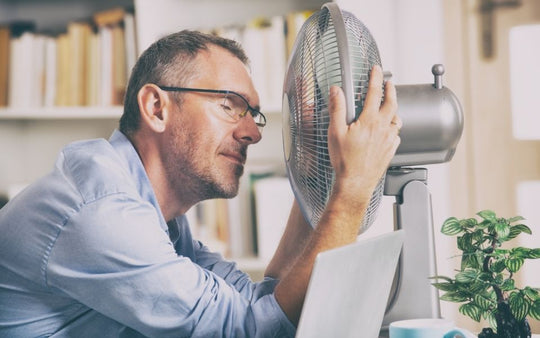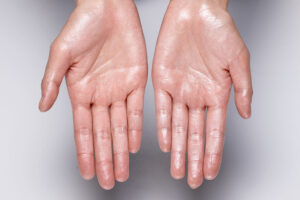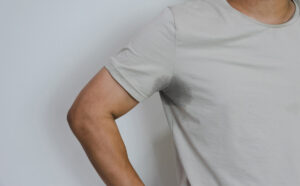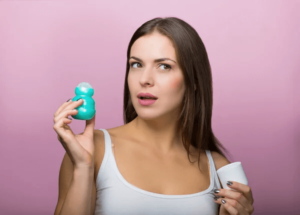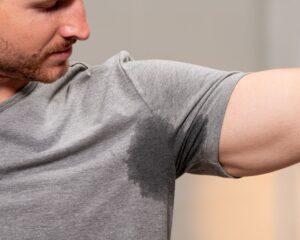Table of Contents
11 Tips to Beat Anxiety and Reduce Stress
- 1. Let Go and Relax
- 2. Try Meditation, Visualization or Yoga
- 3. Dress to Sweat Less and Stress Less
- 4. Limit “Sweat Triggers” from Your Diet
- 5. Drink Your Water!
- 6. Consider a Home Remedy
- 7. Splash Some Cool Water on Your Face and Wrists
- 8. Carry a Handkerchief or Baby Wipes
- 9. Use a Prescription-Strength Antiperspirant
- 10. Anxiety Medications
- 11. Other More Expensive and Invasive Treatments
What is Anxiety?
Anxiety is the emotion you feel when you’re afraid or worried. It’s a natural response to stress. When you feel threatened, physically or emotionally, you feel apprehension and fear about what might be coming.
Anxiety is normal and can be healthy. If anxiety is due to a physical threat, adrenaline is injected into the bloodstream and prepares you with the fight or flight reflex.
Emotional anxiety is that worrisome feeling and unease, sometimes vague, that occurs when no physical threat or danger is apparent, but we fear some social or mental threat. Our emotional anxiety can be caused by negative emotions such as sadness, fear, anger, and rejection, to name a few.
Emotional anxiety is normal. However, normally occurring anxiety and anxiety disorders are two very different things. When our emotional anxiety becomes chronic, hard to control, and interferes with daily life–it’s probably an anxiety disorder.
Why Does Anxiety Cause Excessive Sweating?
We have a love/hate relationship with sweat. The body’s sweating mechanism is a marvel of physiological engineering. When triggered by the hypothalamus in the brain, apocrine and eccrine sweat glands secrete sweat. The evaporation of sweat, composed mostly of water, salt and electrolytes, creates a cooling effect that helps maintain body temperature. Sweating at the gym or when working out is desirable and keeps us healthy.
When does sweat turn from desireable to deplorable? When it’s anxiety sweat — sweat that is excessive, embarrassing and only increases its flow when you begin to stress about it.
Stress and anxiety cause the body to secrete the fight or flight hormones that prepare us for action. These hormones cause our breathing rate to increase, our heart to beat faster, our blood pressure to rise, and–you guessed it–our sweat glands are activated to produce more sweat. A lot more. More than we need, and certainly way more sweat than we want.
Why Does Sweating Lead to Anxiety?
Nervous sweating often leads to even more sweating–sometimes uncontrollably–because we feel self-conscious about it during social interaction. It’s a vicious cycle that feeds on itself.
If you suffer from anxiety sweating, this cycle of stress sweat is probably familiar.
You sweat >>> you stress about sweat >>> your stress causes more sweat >>> your sweat causes more stress… you get the picture.
For many of us, stress and anxiety rear their ugly heads when our confidence is low. We wonder if we have what it takes to succeed in a particular set of social circumstances. In a way, our own bodies betray us by signaling to the outside world that we’re nervous. What do those who suffer from social anxiety fear?
Everyday situations that cause social anxiety sweating are:
- Public speaking
- Making a request or presenting information
- Meeting new people
- Wanting to impress or be accepted
- Fear of rejection
- Being judged or evaluated- as in a job interview
- Looking odd or feeling out of place
- Being thrust into unfamiliar situations
- Wanting to be in control
Do I Have Anxiety?
Let’s be clear: Bouts of anxiety are a natural part of life. It’s a normal response to stressful events and situations we all encounter. Family or relationship problems, changing employment and financial worries are some of the common events that can cause anxiety and some degree of anxiety sweating.
But the kind of normal anxiety that we experience from time to time is much different than the kind of chronic, ever-present anxiety that disrupts our lives at every turn. When the symptoms of severe anxiety overshadow the events that caused them and turn everyday life upside down, they could point to an anxiety disorder.
Here are some of the most prevalent signs and symptoms of anxiety disorders:
Excessive Worrying
This kind of worrying is generally linked to anxiety disorders is way out of proportion to the event that triggers it.
Agitation
Anxiety is our way of telling the nervous system that we’re facing some kind of threat. When that happens, blood is diverted away from your digestive system, your heart rate increases as does the rate of your breathing. And, you sweat excessively. While all this may be appropriate and helpful if a real threat is present, it’s debilitating when the threat is only imagined.
Feeling Restless
Restlessness can be a symptom of anxiety disorder, especially when it occurs in children and teens. Not everyone who has been diagnosed with anxiety experience restless feelings, but it is one of the signs doctors look for in diagnosing anxiety.
Fatigue
If you become easily fatigued, it may be a sign of anxiety. It’s often a sign of depression, too.
Difficulty Concentrating
Many people who suffer from anxiety report having trouble concentrating. Studies including children, teens, and adults demonstrate that 60% to 90% of people diagnosed with anxiety have serious difficulty concentrating.
Feeling Irritable
Muscle Tension
Trouble Sleeping
One of the most frequently reported symptoms of anxiety is falling asleep and waking up often during the night. It’s a chicken and egg conundrum. Does anxiety cause insomnia or does insomnia cause anxiety? We just don’t know.
Panic Attacks
Fear of Social Situations
Excessive Sweating
Cold sweats, night sweats, and excessive sweating on the hands, palms, forehead, face, under the arms–and even sweaty feet– can all be symptoms of generalized anxiety disorder. Excessive sweating and uncontrolled sweating could also be caused by hyperhidrosis. Hyperhidrosis is often the root cause of social anxiety.
Diagnosing generalized anxiety disorder includes a physical exam to determine if anxiety might be caused by an underlying medical condition, such as hyperhidrosis, or medications you’re taking. Your medical history and a psychological questionnaire will also be used to arrive at a diagnosis. One such anxiety disorder test includes questions like these:
- Do a lot of things cause you to worry or feel anxious?
- Do you think you worry excessively?
- Do you worry most days?
- Has it been six months or more that you’ve been worrying like this?
- Do you have difficulty controlling your worry?
- Have you noted physical symptoms like, trouble sleeping, feeling restless, chronic fatigue, tense muscles, trouble with concentration or feeling easily irritated?
- Is your ability to function at work, in social situations, at school or in other areas of importance to you, negatively affected by your worrying?
If you’re wondering if you have an anxiety disorder or if you have anxiety attack symptoms, visit with your doctor. Anxiety disorders and panic attacks can be treated and managed.
What Causes Anxiety?
Stress is the number one cause of anxiety. For those who suffer from anxiety sweating, the phrase, “Don’t sweat it,” seems like mockery. Anxious people stress over almost everything, and that stress makes them sweat. A lot. Learning how to stop stress sweat and finding an effective stress treatment are high priorities.
Stress and sweat travel together, and they’re rarely separated. There are three basic causes of sweat: heat, activity, and–you guessed it–stress. We produce different types of sweat depending on the cause.
Sweat from heat and activity is secreted by the eccrine sweat glands. It is composed of 99% water and small amounts of protein, lipids, and other nutrients. It’s the kind of sweat that cools us down as it evaporates.
In contrast, stress sweat comes from apocrine sweat glands. Of the 2 to 4 million sweat glands that cover our bodies, most are eccrine glands. Apocrine glands are concentrated in areas where there is an abundance of hair follicles, like armpits, and around the genitals. Apocrine glands secrete sweat that is thicker than heat sweat and contains more lipids, nutrients, and proteins. Stress causes the apocrine glands to push stress sweat to the surface of the skin.
Waiting on the skin’s surface is bacteria. When bacteria come into contact with the high levels of protein and nutrients in stress sweat, the bacteria begin to feast. The result is not only unsightly moisture, but it also produces a strong odor. A really bad, offensive odor. To answer the question, “Does stress sweat smell worse than sweat from exercise?” the answer is a resounding YES.
Here’s another interesting tidbit. Recent studies have found that people can tell if sweat odor is caused by emotional stress. Your smelly stress body odor lets everybody know that you’re anxious.
Stress and stress sweat can be caused by perceived physical threats, emotional anxiety, pain, and mental duress. Most of us experience stress sweat before a job interview, making a presentation in a meeting, receiving criticism or evaluation or even running late for an appointment.
How to Stop Stress Sweat
Ideally, the best way to stop anxiety sweating is to simply stop the stress. But for most of us, that’s just not an available option. So, here are a few ways to stop stress sweat and the unpleasant odor it brings:
Deodorants
Antiperspirants
Antiperspirant can block the sweat glands from producing protein-laced sweat which attracts bacteria. When bacteria mixes with stress sweat the resulting odor can be quite unpleasant.
Grab a Deodorant Antiperspirant combo to stop sweat and control odor.
Prescription Strength Antiperspirants
Other Treatments
If you find that antiperspirants or prescription antiperspirants don’t adequately manage or stop your stress sweat, there are other stress sweat treatments. However, these are more invasive and expensive. Treatment options include Botox injections, microwave treatments, and even surgical sweat gland removal.
How to Deal with Anxiety and Stress Sweat
Here are 11 ways to deal with sweat caused by stress and chronic anxiety:
1. Let Go and Relax
Much of the anxiety we all experience from time to time is due to our need to feel in control. Letting go of the urge to control every situation can go a long way to reducing the stress we feel. It sounds overly simplistic but relaxing a little can make a big difference.
2. Meditation, Visualization or Yoga
Meditation can help you contain your anxious feelings and relax your breathing. Relaxed breathing can quell an active stress response and help reduce stress. Visualizing desired outcomes and behavior can help form a healthy response to a stressful situation. Yoga is a mind-body activity that brings together physical activity, breathing control, meditation, and relaxation.
3. Dress to Sweat Less and Stress Less
Wearing loose-fitting clothes that breathes easily can help reduce sweating due to anxiety. Avoid tight-fitting clothing and artificial fabrics that aren’t absorbent and may constrict airflow. Don’t wear the same shoes every day and avoid socks made of cotton as they don’t wick away moisture. Wearing the right socks and changing them often will help keep sweaty feet at bay.
4. Limit “Sweat Triggers” from Your Diet
Your diet and blood sugar level can either help or hinder your efforts to control sweating due to anxiety. Here are some foods and beverages to avoid:
- Stimulants, like caffeine, can put your nerves on edge. Minimize or eliminate coffee, tea, and caffeinated soft drinks.
- Fatty, processed foods are low in fiber and harder to digest. Longer digestion times raise your body’s temperature and can trigger more perspiration.
- Spicy foods.
5. Drink Your Water
Don’t skimp on your water consumption. Water contributes to just about every critical body function. When you don’t get enough water to keep your body running smoothly, it can lead to stress and anxiety. In fact, dehydration and stress go hand-in-hand. Stay hydrated to keep anxiety and sweat at bay.
6. Consider a Home Remedy
Home remedies for controlling sweat include herbal products like sage, chamomile, valerian root, and St. John’s Wort. When applied to the skin, apple cider vinegar is an astringent that can contract skin pores. Tomato juice is thought to have the same astringent effect as apple cider vinegar. Other natural treatments include tea tree oil (another astringent), fresh lemon rubbed on your underarms, and applying cornstarch, baking soda, or baby powder to sweaty areas. These remedies may be less effective if your sweat is caused by an anxiety disorder. But give them a try; they may work for you.
7. Splash Some Cool Water on Your Face and Wrists
Breaking away to a restroom for a few moments to splash some cool water on your face and wrists can help reduce profuse sweating caused by anxiety. Cooling your face and wrists signals the body that its internal temperature is okay. Also, taking, a minute or two away from the action will provide time to take a few deep breaths, slow down your breathing, and can help you relax.
8. Carry a Handkerchief or Baby Wipes
9. Use a Prescription-Strength Antiperspirant
Applying a prescription-strength antiperspirant helps prevent sweat before it can cause you anxiety. A prescription-strength antiperspirant, like SweatBlock, can eliminate armpit sweat for up to 7 days. The powerful aluminum chloride ingredient blocks sweat glands and prevents perspiration from reaching the skin’s surface. Wetness and bad odor are prevented before they even happen. And now, there are specially formulated antiperspirant creams that can be applied to the hands and feet as well.
10. Anxiety Medications
11. Other More Invasive and Expensive Treatments
If none of these remedies are helping you, it may be time to consider other more complex treatments. These medical treatments can be expensive and require a doctor’s care.
Botox Injections
Botox is a neurotoxin made from botulism microbes. Botox injected directly into the areas where sweating is a problem blocks the nerves from communicating with the sweat glands. While effective, Botox injections must be repeated every 6 months or so to prevent chronic anxiety sweat.
Microwave Therapy
Microwave therapy makes use of a device that sucks sweat glands close to the surface of the skin and then destroys them with microwave energy. A qualified doctor must perform this procedure.
Anticholinergic Drugs
Anticholinergic drugs work to block the hormone the nervous system uses to send signals to your sweat glands. When the signals are blocked, you don’t experience sweating of any kind. These drugs are expensive and come with a number of unwanted side effects.
Sweat Gland Surgery
As a final and last resort, doctors can surgically remove your sweat glands from the sites most prone to excessive and uncontrolled sweating. There are some potentially serious drawbacks to this procedure, and that’s why it’s reserved for only the most serious cases.
Dealing with Anxiety Sweating
Everybody experiences anxiety from time to time. But when anxiety takes control of your life and leads to excessive sweating (which in turn causes more anxiety), there are steps you can take to minimize your stress and calm your sweat glands.
The information in this article should better inform and educate about anxiety sweating and what can be done to curtail or eliminate it. Seek to understand the cause of your anxiety and try these tips for reducing sweating and staying calm. One of these solutions is bound to work for you. Think how much better life could be when anxiety sweating is no longer a problem. With the help of these remedies, you’ll be able to calm your mind–and your sweat glands.
You might also like...

Why Do I Sweat So Much? And So Easily?
WHY DO I SWEAT SO MUCH? : ARTICLE CONTENTS Sweating a lot? … when you workout, sleep, after eating, or

Tired of Sweating After Eating? Avoid These 8 Sweat Triggers
Table of Contents Have you ever wondered “why do i sweat when i eat?” Or why a delicious meal or

How to Stop Sweating So Much? 9 Tips to Beat Unwanted Sweat
If you’ve ever suffered through an awkward sweaty hug, a slippery handshake, or a sweat-soaked job interview — this article




